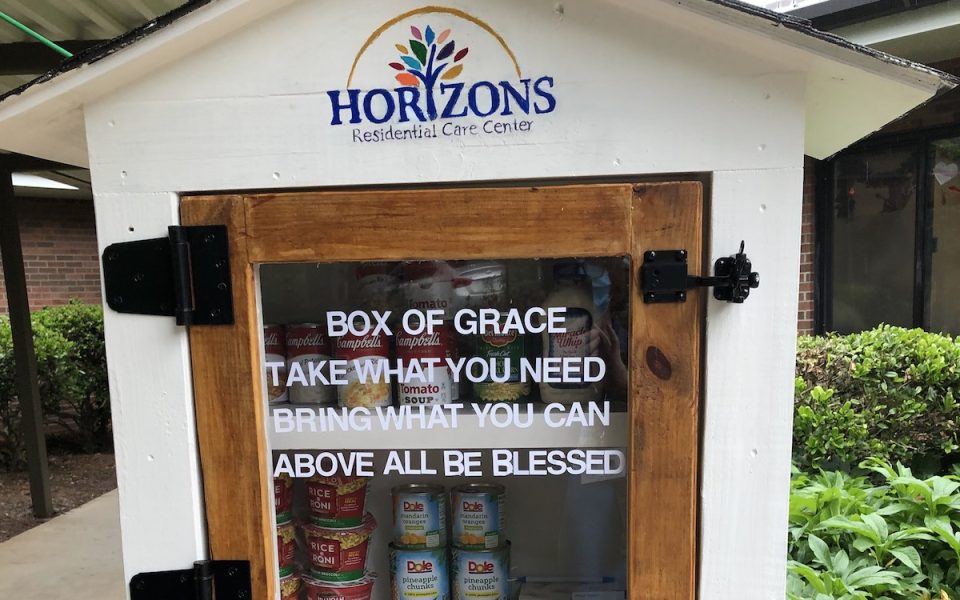Featured image: Horizons Residential blessing box
I don’t remember a time in my life when I was without food, clothing or shelter. To my knowledge, my family never had to use food stamps while I was growing up. I may not have been allowed the latest Capri Sun drink-pouch flavors or Dunkaroos snack packs, but I did grow up in a household with a grandmother who was born during the Depression.
The door of our refrigerator was lined with bottles of sauces, a random vial of perfume with a well-worn lid and bags of flours, tops crumpled with folded edges. Tucked in between would be balls of foil, all misshapen, all filled with bits and pieces of leftovers from meals: Crusty ends of cornbread kissed and blackened by an iron skillet, shriveled strips of chicken breasts, another aluminum parcel with a shard sticking out revealing a magenta strip of bone where the marrow had been scraped clean.
These refrigerated packets were one step removed from the poverty my grandmother experienced growing up as the youngest of 11 in rural eastern North Carolina. Saving those bits of food was like saving pieces of herself. Most of the foil-packet contents rotted before they could be opened, but the act of preserving them was more for self-preservation than anything else.
According to Feeding America, more than 1.5 million people struggle with hunger in North Carolina. Solving the hunger problem is not just one agency’s job. In the Triad and in many communities across the state, there is a small-scale approach to the big food problem — blessing boxes. A blessing box is a tiny food pantry, almost like a Little Free Library of food. It’s a community-driven, often handmade structure where people leave donated goods for others to pick up anonymously. No one person commits to filling any given box, but the generosity of the surrounding community keeps it going.
St. Paul United Methodist Church’s blessing box sits in the heart of the Dreamland community within East Winston. According to a 2016 Forsyth County Food Access Report, this predominately African-American neighborhood is in the largest food desert in Forsyth County. The box itself is handcrafted with doors fitted with glass and shelves full of non-perishable items and toiletries.
“The concept is simple: take what you need and when you’re in a better position or place, bring back what you can,” says Jana Walser-Smith, chair of evangelism ministry at St. Paul UMC.
The box is managed by the evangelism committee. This task includes filling the box on a weekly basis and taking care of any repairs and maintenance. Since its inception in 2018, the church has received generous donations from congregates, the alumnae chapter of Delta Sigma Theta Sorority of Winston-Salem, the Winston-Salem Chapter of Jack and Jill, the State Employees Association of North Carolina and other community donors. Other things like dog food, school supplies, feminine products and personal toiletries are welcome additions.
Blessing boxes work in a way that community pantries do not. Organized agencies want names, addresses and other demographic info from users. There may be limitations on the number of times you can visit and the amount of items you can receive. Some families trek from pantry to pantry, from week to week, to get what they need. Blessing boxes are anonymous. There is no stigma or level of dignity attached to the use of a blessing box. Most of the blessing boxes set up in our area are affiliated with churches or other houses of worship. There is one that was born out of the mess that is the 2020 pandemic.
May 22 is when the blessing box program began at Horizons Residential Care Center. The facility employs approximately 130 employees between two campuses in Rural Hall and Winston-Salem. Most of the staff are direct support professionals who take care of the long-term care facility’s 40 residents. The boxes provide an aegis of care and protection to these front-line healthcare workers.
“We started these blessing boxes when this pandemic started for our employees so they could benefit from them,” says Cindy Arrington, director of resource development and communications at Horizons Residential Care Center.
Contributing to a blessing box is community activism at its finest. Anyone in need and has a need can be blessed by the boxes out in the community.
“They have been a blessing to us,” says Arrington. “On the outside of the box it says, ‘Box of grace, take what you need bring what you can but above all be blessed.’ Not one time since that day have they been empty.”
Blessing boxes in the Triad
- Ardmore Moravian Church, 2013 W. Academy St., Winston-Salem
- Ardmore UMC, 630 S. Hawthorne Rd., Winston-Salem
- First Baptist Church, 405 N. Main St., High Point
- Friedburg Moravian Church, 2778 Friedberg Church Rd.
- Horizons Residential Care Center, 5900 Bethabara Park Blvd., Winston-Salem and 101 Horizons Lane, Rural Hall
- New Philadelphia Moravian Church, 4440 Country Club Rd., Winston-Salem
- St. Paul United Methodist Church, 2400 Dellabrook Rd., Winston-Salem
- Sharpe Road Church of Christ, 2400 Sharpe Rd., Greensboro
Join the First Amendment Society, a membership that goes directly to funding TCB‘s newsroom.
We believe that reporting can save the world.
The TCB First Amendment Society recognizes the vital role of a free, unfettered press with a bundling of local experiences designed to build community, and unique engagements with our newsroom that will help you understand, and shape, local journalism’s critical role in uplifting the people in our cities.
All revenue goes directly into the newsroom as reporters’ salaries and freelance commissions.


Leave a Reply